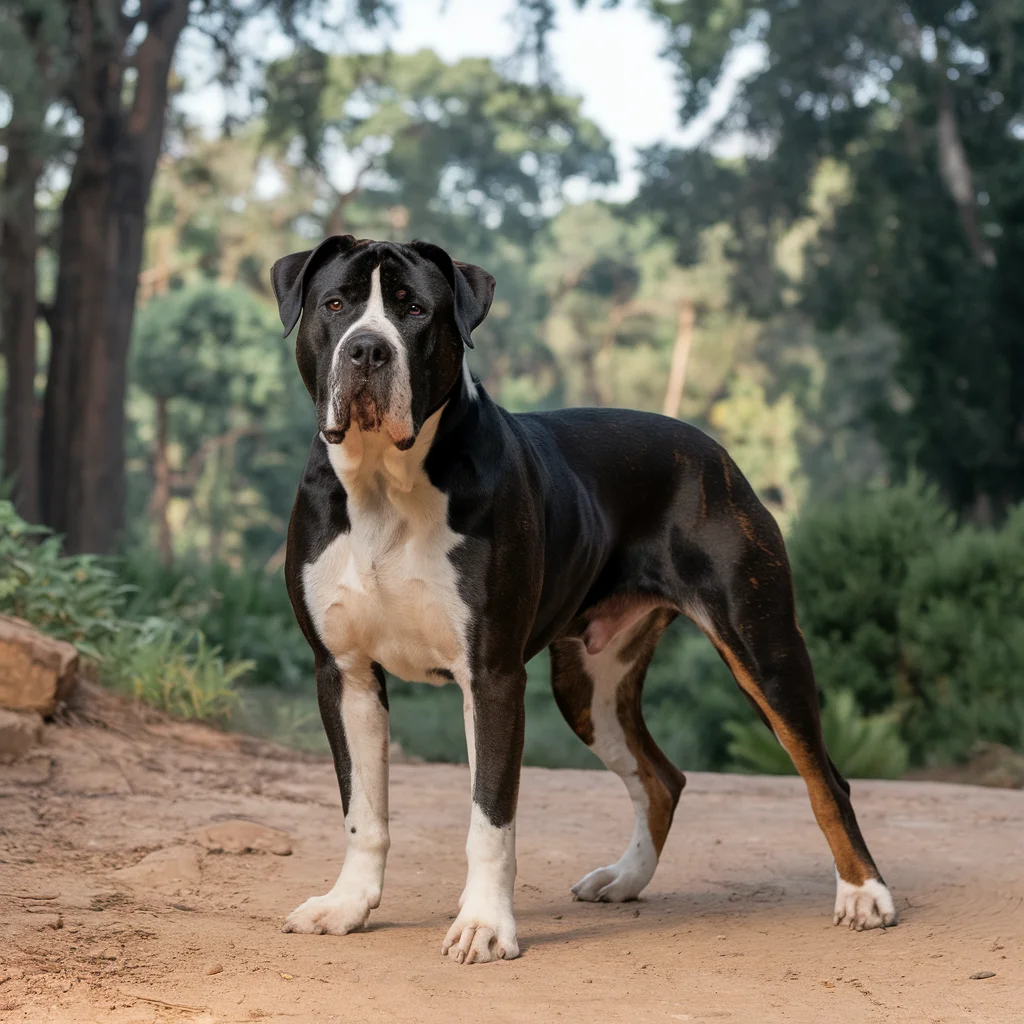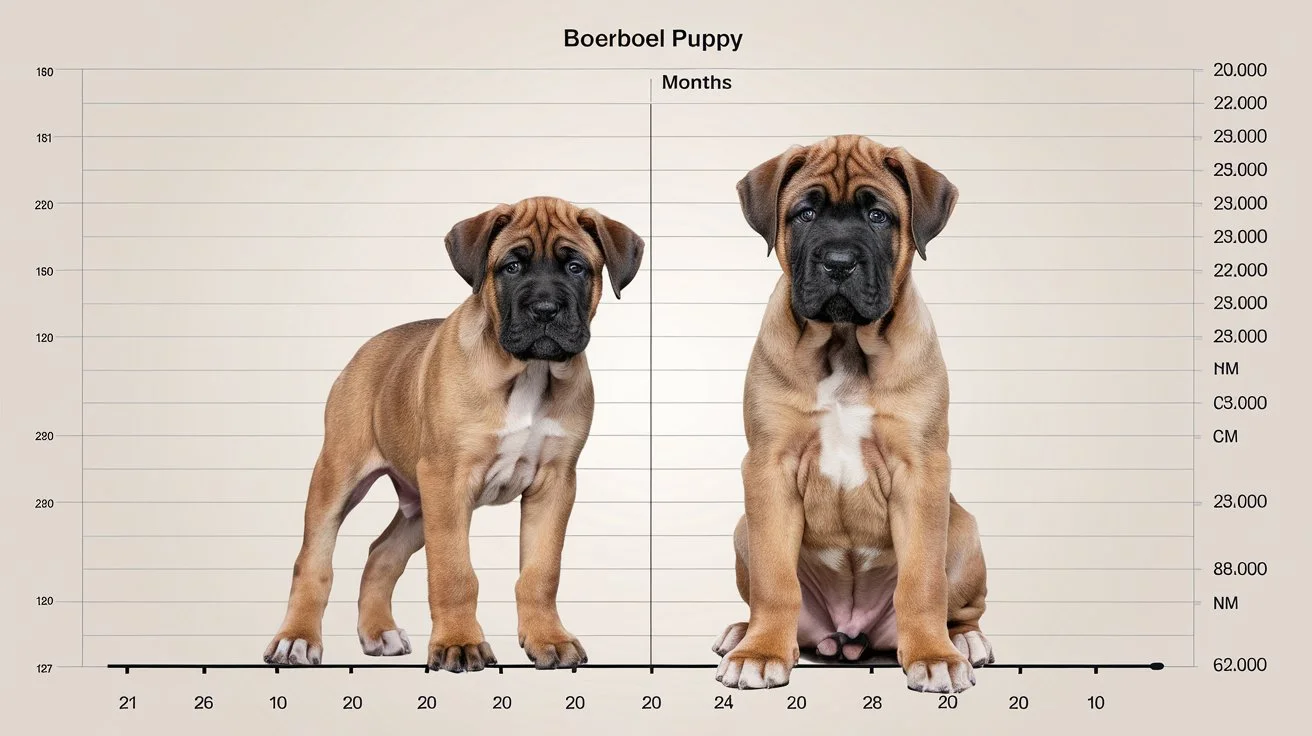Understanding your Boerboel’s growth is essential for ensuring they develop into a healthy and strong adult.
This article will provide a comprehensive Boerboel growth chart, detail the growth stages of this remarkable breed, discuss factors that affect their growth rate, and share valuable tips to help your dog thrive.
Understanding the Boerboel Breed

The Boerboel, originally bred in South Africa, is a large, powerful dog known for its loyalty and protective instincts. As a guardian breed, they were historically used to protect farms and livestock.
Their temperament is generally friendly and affectionate, especially towards their families. However, they require proper socialization and training from an early age to ensure they grow into well-mannered adults.
Tracking their growth is vital not only for health monitoring but also for training and socialization purposes. Knowing what to expect at each stage helps you provide the best care possible.
Boerboel Growth Chart
A Boerboel growth chart serves as a visual guide to track your dog’s growth. Below is a general overview of the expected weight and height ranges for Boerboels at various stages of their development.
| Age Range | Average Height (inches) | Average Weight (lbs) |
| 0-4 Weeks | 8-12 | 10-20 |
| 1-3 Months | 10-16 | 20-30 |
| 3-6 Months | 16-20 | 30-50 |
| 6-12 Months | 20-24 | 50-85 |
| 1-2 Years | 24-28 | 85-150 |
Note: These figures can vary based on genetics and overall health.
Boerboel Growth Stages

0-4 Weeks
During this initial stage, Boerboel puppies are heavily dependent on their mother. They begin to open their eyes and ears, starting to engage with their littermates.
This period is crucial for socialization, as puppies learn important behavioral cues during play.
1-3 Months
From 1 to 3 months, your puppy will experience rapid physical and behavioral development.
They will start walking, exploring their environment, and beginning basic training. Initial vaccinations are critical during this stage to ensure their health. Socialization with people and other animals is essential to develop their confidence.
3-6 Months
At this stage, your Boerboel will undergo significant growth spurts. They may seem clumsy as they adjust to their growing bodies. It’s important to start formal training to establish good habits early on.
Socialization remains vital, and introducing them to various environments will help them become well-rounded adults.
6-12 Months
The transition to adolescence occurs between 6 to 12 months. Your Boerboel will test boundaries and may exhibit stubborn behavior. Consistent training and socialization are crucial to navigate this stage successfully.
Nutritional needs also change, requiring adjustments to their diet to support their growing bodies.
1-2 Years
By the time your Boerboel reaches 1 to 2 years, they will be nearing their full size. However, their mental maturity may take longer to develop.
This stage is perfect for reinforcing training and ensuring they are well-behaved companions. Regular vet check-ups are important to monitor their health.
At What Age Is a Boerboel Fully Grown?
Typically, Boerboels reach their full height around 18 months but may continue to fill out in weight until they are about 2 years old.
It’s essential to have realistic expectations about their size, understanding that each dog is unique.
Factors That Affect Boerboel’s Growth Rate

Genetics
Genetics plays a significant role in determining the growth rate and eventual size of your Boerboel. Puppies from champion bloodlines may have different growth patterns compared to those from average lines. Always consider the lineage when assessing growth potential.
Nutrition
A balanced diet is crucial for the proper growth of your Boerboel. Providing high-quality puppy food that meets their nutritional needs will support healthy development. Look for foods that are rich in protein, vitamins, and minerals.
Physical Activity
Regular exercise is important for maintaining a healthy growth rate. Activities like walking, running, and playing fetch help develop muscles and maintain a healthy weight. However, avoid excessive exercise in young puppies, as their joints are still developing.
Health
Routine veterinary check-ups are essential for monitoring your dog’s health. Vaccinations, parasite control, and regular health screenings will ensure that any potential health issues are addressed promptly.
Spaying/Neutering
Spaying or neutering your Boerboel can impact their growth. Some studies suggest that early spaying/neutering may lead to a larger size, while delaying the procedure can result in a more balanced growth rate. Consult your veterinarian for personalized advice.
What If Your Boerboel Is Too Big?
Sometimes, a Boerboel may grow larger than expected. This can raise concerns about health and mobility. If you notice your dog is excessively large, consider the following:
- Consult a Veterinarian: They can assess your dog’s overall health and determine if there are any underlying issues.
- Diet Review: Ensure you are providing a balanced diet appropriate for their age and activity level.
- Regular Exercise: Ensure your Boerboel gets enough exercise without overexerting themselves.
If your vet finds that your dog is healthy but simply larger than average, embrace their unique size!
Tips to Help Your Boerboel Grow

Proper Diet
Providing a proper diet is essential for your Boerboel’s growth. Opt for high-quality dog food formulated specifically for large breeds. Look for the following:
- High protein content: Look for meat as the first ingredient.
- Vitamins and minerals: Essential for overall health and development.
- Controlled calorie intake: Prevents obesity, which can harm their joints.
Change the Feeding Schedule
As your Boerboel grows, their feeding schedule may need to adjust. Puppies require more frequent meals. Here’s a general guideline:
- 0-3 months: 4 meals per day
- 3-6 months: 3 meals per day
- 6-12 months: 2 meals per day
Adjust as necessary based on your dog’s needs and vet recommendations.
Weight Gain Snacks
Healthy snacks can support growth but should be given in moderation. Consider options like:
- Carrots: Low-calorie and high in vitamins.
- Sweet potatoes: Rich in fiber and nutrients.
- Commercial puppy treats: Look for those made specifically for large breeds.
More Exercise
Encourage regular physical activity to promote healthy growth. Activities should be suitable for their age and energy level. Suggestions include:
- Daily walks: Start with shorter distances and gradually increase.
- Playtime: Engaging in games like fetch or tug-of-war.
- Socialization: Regular visits to dog parks to interact with other dogs.
Rule Out Health Problems
If you notice unusual growth patterns or health concerns, consult your veterinarian. Early detection of health problems can make a significant difference in your Boerboel’s development.
Write Down Everything
Tracking your Boerboel’s growth can help you monitor their health and development. Consider maintaining a journal that includes:
- Weight and height measurements: Regularly update to track growth.
- Diet changes: Note any adjustments to their feeding routine.
- Exercise routines: Document activities and playtimes.
Tools like apps or spreadsheets can help streamline this process.
Does Size Really Matter?
When it comes to the Boerboel, size does have its importance, but health and behavior matter more. Understanding your dog’s individual needs and capabilities is essential. Here’s why:
- Health Considerations: Larger dogs may face specific health challenges, including joint problems.
- Behavioral Traits: Training and socialization can influence how well your dog interacts with their environment, regardless of size.
Ultimately, a healthy, well-trained Boerboel will be a happy companion, regardless of whether they fit the average size profile.
Conclusion
Understanding the growth stages of your Boerboel, along with the factors influencing their development, can significantly impact their overall health and well-being.
By following the tips outlined in this article, you can help your Boerboel grow into a strong, healthy adult. Remember to keep an eye on their diet, exercise, and health to ensure they live their best life.
With proper care and attention, your Boerboel will thrive, becoming a loyal and beloved member of your family.












